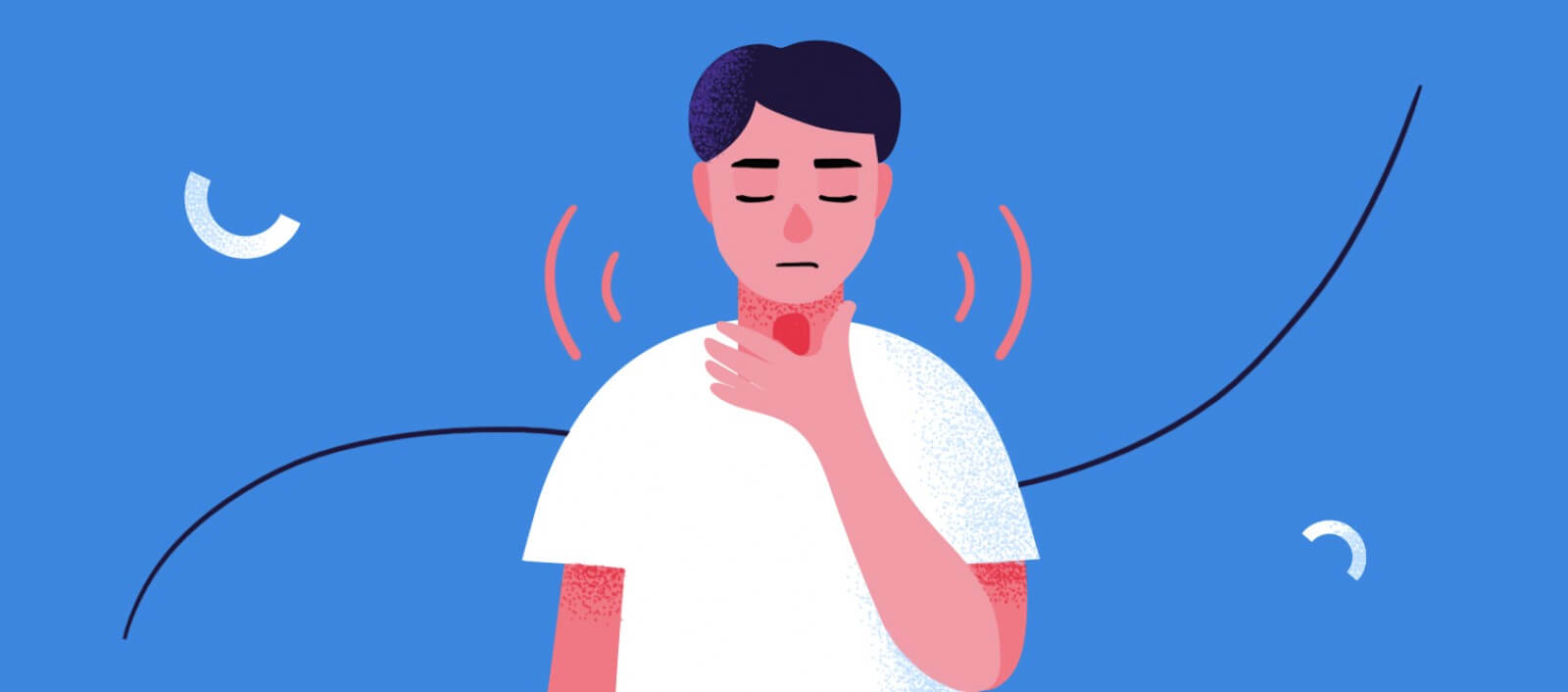
You’re probably familiar with some of the “typical” symptoms of anxiety. Anxiety can make you feel tense, cause nausea, lead to sweating, and so on. These are the symptoms that most people associate with anxiety.
But anxiety can cause a host of unusual symptoms as well, and one of the more frightening is a feeling of having a lump in your throat.
“Feels Like Something is Stuck in My Throat. Is it Anxiety?”
Anxiety and stress can have a profound effect on your body, and one such effect is inflammation, caused by the activation of your autonomic nervous system. Depending on the type of anxiety you experience, that inflammation can feel very severe.
When you suffer from anxiety, your body is constantly stimulating your sympathetic nervous system. This leads to an increased heart rate, increased breathing rate, and muscle tension. In some people, that muscle tension can cause the throat to feel inflamed. In many people, that feeling is described as a “lump in the throat” or a “throat knot.” It may be referred to in medical circles as
- Globus Pharyngis
- Globus Sensation
- Globus Hystericus
When anxiety causes the lump in your throat, it isn’t dangerous, but it can feel very frightening. In some cases, you may even feel as though you’re choking, or that you’re at risk of choking, and the anxiety may make it hard to swallow.
How to Tell the Difference Between Anxiety Throat Lumps and a Health Problem
If you’re concerned that your knot may be the result of a physical health problem, rather than a mental health problem, you should consider seeing a doctor. In very rare cases, a lump in the throat may be something more serious, such as a type of cancer. Or it may be something less serious but still health-related, like gastrointestinal reflux disease (GERD), tonsillitis, pharyngitis, or postnasal drip. Interestingly, some believe that anxiety may contribute to GERD.
Yet in many cases, the cause is nothing more than anxiety, and what’s worse is that the anxiety often makes people focus on worst-case scenarios—possibly even more than those that don’t have anxiety throat lumps!
Only a doctor can tell you if it’s something like globus pharyngis from anxiety and not something more serious. But some signs that it may be anxiety include:
- There is no clicking sound or severe pain when swallowing.
- The experience comes and goes, and is more common when you’re feeling high anxiety.
- You have suffered from a panic attack or recent very stressful situation.
In these cases, it’s still possible for the cause to be health-related. It’s also possible for stress and anxiety to cause a constant lump in the throat that doesn’t go away and may even cause a tiny bit of pain.
Still, the most common cause of throat lumps is stress and anxiety, and many of those who suffer from anxiety symptoms or severe stress experience such lumps.
Rest assured that when anxiety causes a lump in the throat, it’s not dangerous and it cannot stop you from breathing or prevent you from swallowing. It may feel as though you need to swallow multiple times to get the food down, but it’s still just anxiety, and it can be treated by curing yourself of that anxiety.
Are there any Fast Cures for a Lump in the Throat?
Unfortunately, the only way to stop the globus pharyng is to reduce your anxiety. There are no specific treatments for anxiety throat lumps because they’re caused by the activation of your body.
There are a few tips you can try:
- Drink Water - drinking water can reduce this lump feeling in two ways. First, by drinking water, you’re able to feel the water going down your throat, which may calm down some of your worries. Second, there are some indications that hydration, in general, can reduce the sensation of a lump.
- Jogging - jogging may not be ideal if you’re having a panic attack or feel like you’re having problems breathing, but if you just feel stressed, jogging is an amazing help—more than most people realize. It’s not just for health; jogging actually releases chemicals in your body that reduce stress, and may relax your throat muscles.
- Herbal Solutions - herbs like passionflower, kava, and valerian can be effective at reducing stress and anxiety. Make sure you research any of these herbs before you decide if it’s the right choice for you.
You Can Get a Lump in the Throat Even When You Don’t Think You’re Anxious
When you suffer from anxiety, your body sometimes reacts in unusual ways. Some people experience some of the physical symptoms of anxiety even when they’re not feeling anxious. That means that you can suffer from a lump in your throat even if your thoughts are completely relaxed, and it may still be anxiety-related.
That’s why it’s so important to take long-term steps towards reducing your anxiety once and for all.
How to Get Rid of the Lump In Your Throat Permanently
For better or worse, there is no rapid cure for the lump in your throat. It’s caused by stress and anxiety, and only by relieving that anxiety will the lump in your throat ultimately go away.
But don’t be too worried—anxiety commonly creates the feeling of having a globus sensation, and if you’re feeling stressed and anxious, then that is normal. Try calming yourself down, for now, using any safe coping strategies you’re used to, and focus on ways to cure your anxiety in the future.
SUMMARY:
Anxiety causes your muscles to tighten, including those in your neck. Combined with the sensitivity that many people have to the way their body feels with anxiety, it can make the lump feel severe. It is not dangerous, but it is stressful, and only by eliminating anxiety can it be stopped.












